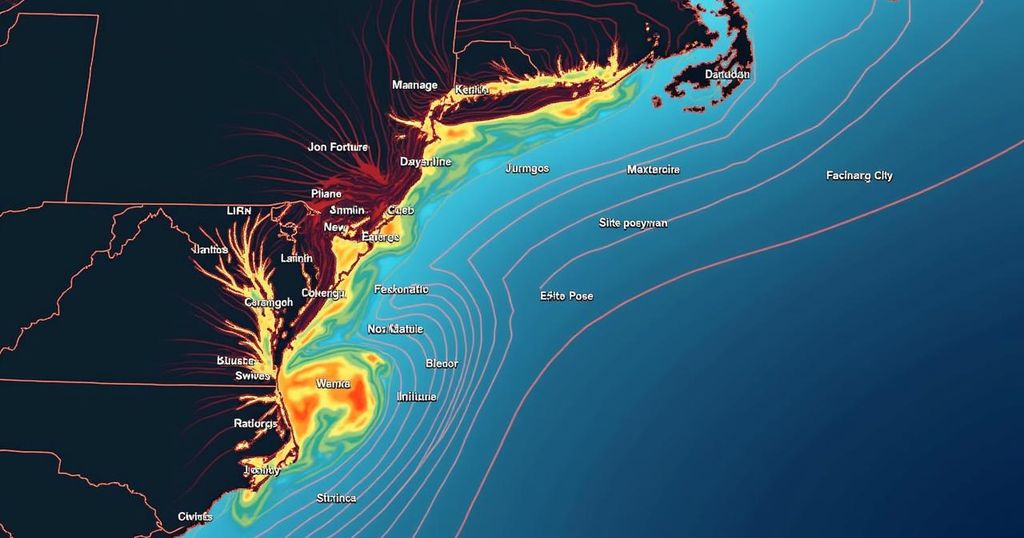Understanding the Impact of Hurricanes on Severe Weather Events in the Southeastern United States

Hurricane Helene has caused significant disruptions across the Southeastern United States, leading to road closures, power outages, and extensive flooding attributed to flash floods in Virginia, North Carolina, and Georgia. Research by Prof. Majid Shafiee-Jood highlights the hydrological impacts of hurricanes and the importance of effective evacuation order responses from communities. His studies lead to the creation of the first-ever database tracking hurricane evacuation orders to evaluate public decision-making during such crises.
Across the Southeastern United States, severe weather impacts are being felt as a consequence of Hurricane Helene, leading to road closures, widespread power outages, and devastating floods particularly in mountainous regions of Georgia, North Carolina, and Virginia. Majid Shafiee-Jood, a research assistant professor in civil and environmental engineering at the University of Virginia, provides insights into the mechanisms behind these phenomena. According to Professor Shafiee-Jood, hurricanes are characterized by rapidly rotating wind systems and intense thunderstorms. These storms accumulate substantial moisture, often resulting in excessive rainfall. Fast-moving storms can trigger flash floods—rapid flood events that occur shortly after heavy rain, unlike the coastal flooding associated with storm surges. Flash floods are particularly hazardous in urbanized areas where paved surfaces hinder water infiltration, and in mountainous terrains where precipitation can quickly lead to runoff, often exacerbating risks of mudslides and landslides, as witnessed in parts of Virginia and western North Carolina during recent weather events. Such occurrences are not unprecedented. Professor Shafiee-Jood cited Hurricane Michael as an illustrative example from 2018, where similar conditions led to significant rainfall and flooding in Georgia and the Carolinas, impacting local infrastructure like the Banister Dam in Halifax County. Professor Shafiee-Jood is also involved in pioneering research to assess public responses to evacuation orders during hurricanes, which led to the establishment of the first hurricane evacuation order database. He emphasizes the importance of understanding how communities react when faced with hazardous weather information, such as the flash flood alerts received in Charlottesville related to Hurricane Helene. This refers to a broader inquiry into the effectiveness of emergency management practices and the behavioral responses of individuals to official advisories, enabling a better grasp of how evacuation orders are acted upon by the public. Overall, the current weather events serve as a stark reminder of the interconnected nature of hurricanes and their aftermath across states, raising critical questions regarding preparedness, infrastructure resilience, and community responsiveness to extreme weather warnings.
The article examines the consequences of Hurricane Helene on the Southeastern United States, particularly focusing on how severe weather conditions, such as flash floods and landslides, can arise from hurricanes that form further south. It highlights the research conducted by Dr. Majid Shafiee-Jood, who analyzes the implications of hazardous weather on public decision-making, particularly in the context of flood responses and evacuation orders. The discussion showcases how hurricanes, characterized by high moisture and strong winds, can produce intense rainfall that leads to rapid flooding events and challenges communities in urban as well as mountainous regions. Furthermore, the article presents insights into a newly developed evacuation database aimed at quantifying public responses to emergency weather notifications.
In conclusion, the fallout from Hurricane Helene exemplifies how hurricanes influence weather patterns far beyond their immediate location, resulting in significant impacts such as flash floods in affected regions like North Carolina and Virginia. The research conducted by Professor Shafiee-Jood sheds light on the decision-making processes during hazardous weather situations, underscoring the importance of effective communication and public response strategies to ensure safety during such emergencies. Through the establishment of a rigorous evacuation database, researchers aim to enhance understanding of community behavior in response to weather advisories, contributing to improved emergency management practices in the future.
Original Source: news.virginia.edu







